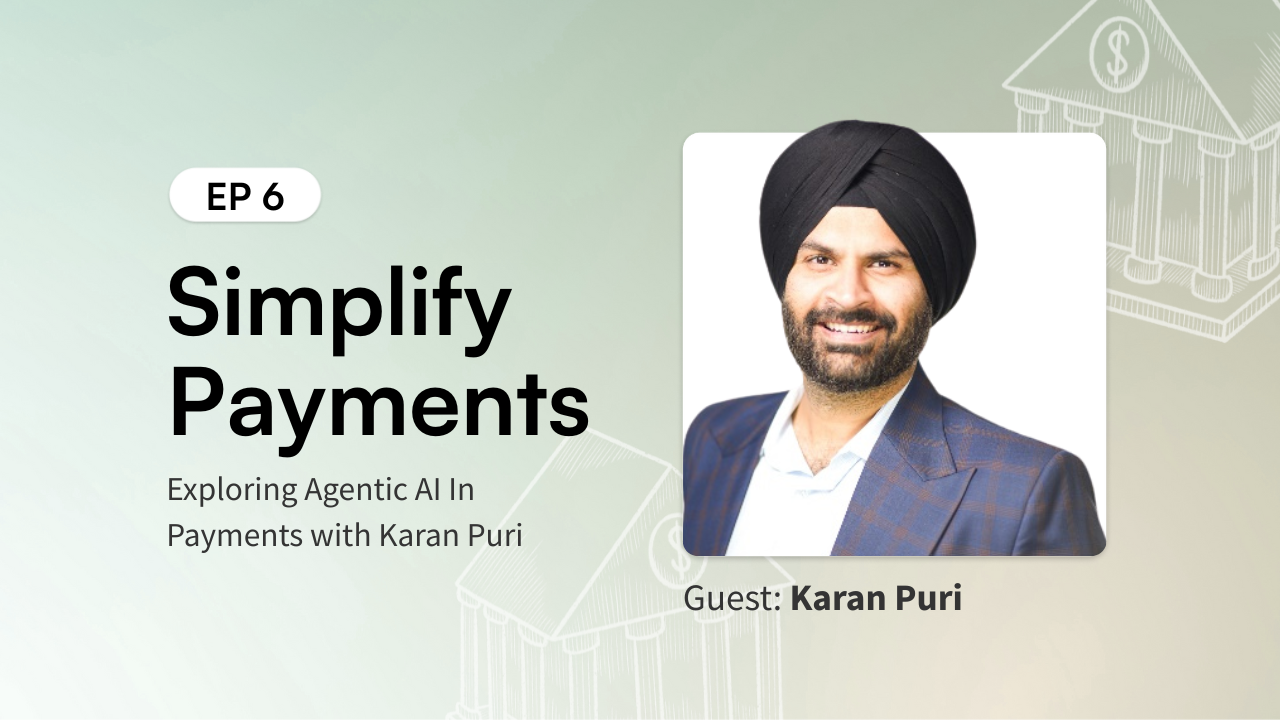Get Started



In this episode, we discuss how agentic AI is redefining digital identity and powering next-generation wallets that go beyond storage, becoming personal financial agents that act intelligently on behalf of users.
Guest: Karan Puri, Associate Vice President at TD Bank
The Simplify Payments Podcast, presented by Paramount Commerce, is a podcast series that takes a closer look at new and emerging financial technologies and practices with some amazing industry experts.
Please like, comment, and share this video. Also, stay up to date with our content by subscribing to our YouTube channel.
Full episode transcript:
Varad Mehta: Hello everyone, and welcome to Simplify Payments, a podcast series presented by Paramount Commerce. I'm your host, Varad Mehta. In Simplify Payments, we take a closer look at new and emerging financial technologies and practices with some amazing industry experts. Our episode for today is a special one because the sixth episode was recorded live at the Money 20/20 conference in Las Vegas. Our VP of Marketing and also guest host, Kristi Lewis, got to explore how Agentic AI is shaping the future of Canadian payments. Our expert for today is Karan Puri, the Associate Vice President at TD Bank. So sit back and enjoy the show.
Kristi Lewis: Hello, everyone, and welcome to the Simplify Payments podcast. I'm your host, Kristi Lewis, and we are recording live from Money 20/20 here in Las Vegas. All right, today we are jumping on the bandwagon. We are diving into a very popular topic, you guessed it, agentic AI. Now, joining us to share how AI is changing the landscape of digital identity is Karan Puri, Associate Vice President at TD Bank. For me, this is a treat because Karan and I actually worked together at TD about 10 years ago. I mean, I hate to date myself like that, but it’s nice. I feel like my old world and my new world are colliding. They're coming together. So while I know you, why don’t you introduce yourself for the audience?
Karan Puri: As a matter of fact, just to complete that thought, Kristi was one of the people who interviewed me for a role in her larger team, the Everyday Banking Group. So hi, Kristi. It's been a while. Very quickly, I've been with the bank for over 10 years, and I started my journey as a corporate banker, and I got into everyday banking product management. The last five years or so, I've been in this group now called Enterprise Digital Strategy, but it is focused on external ecosystem and partnerships. We focus a lot on innovation outside into the bank. Key areas of focus for me have been digital identity, open finance, open banking, and most recently, dabbling into personalization—a lot to do with data. I would admit in this innovation space, my angle to any open finance or open data conversation has been from digital identity. I understand that topic better than anything else, and so it also becomes my anchor to understand any of the concepts. So if I try to answer your questions today, I might bring that angle. Not an expert in any of these topics, but I understand identity better than anything else.
Kristi Lewis (KT): Fantastic. I look forward to it. All right, so if you are a fan of the show, you will know that we always like to begin with a fun question, just to warm ourselves up a little bit. Word on the street is that you are a bit of a foodie. And a little birdie told me you have a culinary background and you like to specialize in vegan food. So say you’re going to host a dinner party, and you’re really trying to impress somebody. What dish are you making and why?
Karan Puri (KP): I think I know it. It's going to be this—I'm not sure if you’d call it an appetizer or a meal—but it’s going to be with mushrooms, halloumi, and spinach with a bit of nutmeg. So when you look at mushrooms, you know what flavour you expect. When you add spinach, you also understand what it would turn out to be. Add halloumi, it goes a bit high on the salt and balances the mushroom and spinach. But when you put nutmeg into it, I think most people would not know what to expect out of it. To me, that would be my choice. Actually, I did that at a corporate event.
KT: Expect the unexpected.
KP: Yeah, absolutely.
KT: I'm getting hungry just thinking about it. Okay, let's dive into the topic of the hour—agentic AI. Many people, when they hear AI, think ChatGPT. But agentic AI goes far beyond that. Break it down for us—what does the term agentic mean, in layman's terms? And how is that different from 'AI'?
KP: Needless to say, everything I'm going to mention is in layman's terms. How I understand it is how I'm going to translate. Chatbots, to me, they respond. Agents, they act. And what I mean is that the intent of agentic AI is to contextualize, converse, and then provide guidance and advice to the customer or to whoever is interacting. A simple example: if someone is looking to find out what credit cards they hold, that's a question. Obviously, that's a very deterministic response—"Here's what you have with the organization." But when you start putting in some information around, "What do you use it for? Do you use it for travel? Are you duplicating your cards? Are you optimizing your rewards? Are you using your points?" that’s when it starts going from a chatbot—purely a triage—into a conversation that helps, advises, and guides you to make a decision. That's my understanding of agentic AI. When you bring it into the context of financial institutions or other organizations, the key is data. Agentic AI can only be as powerful as the data it accesses. Its ability to understand the customer determines how effective the agentic AI will be. So: basic chatbot, predetermined questions; agentic AI, more of a guide, an advisor.
KT: Got it. So less of a simple question and answer, more actually taking that context and acting on it—which, I think, is a big distinction. So, very interesting, thank you. Okay, let’s look at agentic AI in the context of financial services. I’d like to talk about the evolution we’re seeing in digital wallets. No longer are they just storing cards to make payments—they're becoming more of identity platforms. What role do you see agentic AI playing in that evolution?
KP: It's interesting. It’s been over 10 years since Apple launched payments on Apple Pay, and the wallet was perceived as the e-commerce or checkout container for the customer. Now, 10 years later, what you see is boarding passes and tickets being stored in wallets. There’s also a lot of movement around ID identity in wallets—mobile driver’s licenses, Aadhar card in India, where a customer can carry and store a credential and use it when necessary. There are many stakeholders in this ecosystem, and it's becoming really important. There was a time when financial services were consolidated through a customer's lens—you had one primary bank, and all the products were there. From there, we moved to fragmentation, and now, I think, fragmentation is the new normal. If any stakeholder in the ecosystem—fintech, bank, government, service provider—wants primacy, wallets provide that agency to the customer.
KT: Right. That’s your one-stop shop for fragmented financial services you have across different industries or providers.
KP: Absolutely. That’s where the wallet journey is evolving. Now, slap agentic AI on top of that. Now, you're talking about customers not just storing credentials in the wallet—agentic AI can determine the intent of those credentials. If someone’s asking for income verification, for instance: what part are you asking for? Do you want to know if you have sufficient balance? A specific amount? Your age? Are you over 18? The wallet with agentic AI could dynamically determine which piece of the credential to share—or even if you need to share the credential. Sometimes you just need to share a response—are you over 18, yes or no—rather than the underlying credential.
KT: That’s so interesting. Instead of relying on a physical piece of ID, all that information can be stored and used for different purposes. So, say, if you're buying something and need to be over 18, instead of uploading a new document, that could be done directly through the digital wallet. And you could send a yes/no response via API or similar, back to the store.
KP: Exactly. In that whole credential aspect, whether payments, cards, credit capabilities from different instruments—all can reside there. In any ecosystem—say, Canada—trust becomes an important factor. If financial institutions, if banks have a trusted brand, they can play an important role. There is no clear winner in this “wallet war,” but if you don't participate, you lose in terms of customer primacy.
KT: Right. That brand piece is so important for banks—they’ve built up a trusted, stable reputation in the financial ecosystem. Maintaining that trust and continuing that brand equity in the new world of agentic AI will be very important.
KT: Maybe let’s chat about agentic AI with payments. If you make a purchase and the system can confirm your identity, could it also actually make a payment on your behalf? Do we see any challenges with that?
KP: I’ve read use cases with payments—I saw one where you’re planning travel, figuring out airlines, hotels, dates, best prices. You have it all planned out—then you want to execute. I know my payment friends are working on agentic payment pieces and can speak elegantly on it. But I’ve seen use cases conceptually happening. I looked at my card reward optimization—checking points, avoiding duplication. An agentic AI could help recommend the best solution, but to execute I still had to call five different institutions. Imagine if that execution could be triggered through the AI. Payments as a use case requires a higher level of assurance, but the concept of “know your agent”—like “know your customer”—will become important before you solve agentic payments.
KT: We're coining a phrase—KYA, know your agent! This will become the new regulatory standard.
KP: There’s actually a panel tomorrow on KYA.
KT: Ha! Well, we didn’t coin it here, but yes. Agentic AI is very interesting for consumers and businesses—convenience, speed, automation. But a whole slew of regulatory questions emerge. What happens if an agent makes a purchase you didn’t want—who’s liable? So, let’s talk about data agency and ownership: the major considerations in financial services. How do you recommend balancing personalization benefits with privacy in AI-driven solutions?
KP: A few points. First is the principle of data dignity—giving customers power to decide how, when, and why their data is used, even as AI acts on their behalf. Personalization doesn’t require surveillance, but contextual intelligence—using what’s relevant at the moment. Agentic systems introduce progressive consent, shared dynamically, purposefully, and revocable—not permanent. The balance is between insights and restraint; trust is built by showing customers that privacy and personalization are not opposites but partners. The future of AI in banking depends less on data volume and more on ethics—how transparently we govern, not just how intelligently we analyze. It’s about translating trust built over years in a new world of AI.
KT: There will definitely be a balance between convenience and how the consumer grants permission to share data. How will that be managed? Will people have to go into different apps to grant permission for different benefits? If there's one consolidated place for all information, it’s much easier than logging into every bank app to grant specific permissions. What do you think this could look like?
KP: This isn’t that different from previous open banking or consumer-driven banking discussions—it's permission-led. The whole “control tower” concept is where preferences and intent are stored to ensure data is shared for a specific use case. US regulation 1033 says data can only be used for a primary use case, not a secondary. The ability for organizations to store preferences and call on them when needed—on both the organization and customer side—is vital. For example, reminding customers that consent was provided for a case, and asking if they want to extend it.
KT: So, progressive, cross-use-case permissions.
KP: Right. The open finance/design experience isn’t fully figured out yet. Design will play a huge role—making it frictionless and seamless is critical so customers will adopt it. The intent of open finance is convenience, but the experience must be convenient to achieve adoption.
KT: True. Sometimes we, in financial services, focus too much on how AI works for us, rather than realizing the consumer or business will drive most innovation, based on their needs. We have to keep their needs at the forefront in all AI/digital identity work.
KP: And to complete that thought—the customer isn’t thinking about this! They're not waking up thinking about wallets, open finance, banks talking to government. We’re the ones thinking about it, so we need to make the experience super seamless for the few seconds of attention they’ll give it.
KT: Right. That’s a great point. I heard you say “trust” several times. On another panel, the idea came up: if trust is the new currency in a digital ecosystem, what does that mean for banks or fintechs? How do they earn and sustain trust?
KP: Trust is less about brand now, and more about behaviour, transparency, ethics, and how responsibly the AI acts on the customer’s behalf. We're not there yet, but customers want to be sure their payments and journeys are handled correctly. It's a shift—from “trust me because of my brand” to showing, through actions, that customer preferences are kept in mind. Design is vital for trust. Every interaction becomes a “trust transaction.” Trust is now an innovation metric—measured not just by uptime or accuracy, but confidence retained. Sustaining trust means building accountability in from day one. You can't “patch” trust into layers—it has to be designed-in.
KT: So it’s “don’t trust us, the people—trust the AI agent we’ve built to act responsibly for you,” which is a totally new game in building trust between financial services and customers.
KP: Lots of fintechs and startups begin by building confidence through their products, not by their brand. Their “positioning” is no positioning—they build a product that is focused on trust, then expand the suite from there.
KT: So the trust is “it just works.” Okay, let’s think global. Canada isn’t known as first-to-market. What lessons can Canada draw from other regions leading in digital ID and AI—like the Nordics, Singapore, EU?
KP: Until 10 years ago, Canadian banks/government were ahead of most countries. The Nordics, for instance, have a 20+ year-old digital ID scheme, public/private-sector, bank-led. It’s a strong working ecosystem, interoperable for passports, banking, drivers’ licenses, housing, etc. Canada took an early leap but politics and the climate have slowed things since. Singapore’s newer SingPass system is highly interoperable—citizens move seamlessly between government/financial services because standards aren’t siloed. The EU is building its identity scheme (EIDAS, a European wallet), aiming to interoperate between all 27 countries under strong governance. There’s also the regulatory element pressing Apple to open the NFC on Apple Wallet to ensure fair access. That’s driving change worldwide. Canada can’t just replicate Asia or Europe, but there's enough learning here to move forward. The Digital Identity and Authentication Council of Canada aims to bring together public/private sector for identity and authentication. The basics of identity must be solved before more complex, “sexier,” AI-driven solutions appear.
KT: Interesting. Hopefully, Canada can learn from those countries and implement a ubiquitous solution across entities. Final question—get out your crystal ball: Next five years, how do you envision the convergence of identity, wallets, AI, and a truly agentic financial experience for Canadians? Paint that picture.
KP: A few points: There will be convergence—identity, payments, open banking come together with AI, making customer experience seamless and accountable. Wallets won't just be credential containers—they'll act on behalf of the customer. Customers have agency; AI agents grant them decision-making power. For Canadians, an agent might compare rates, renew IDs, pay bills to avoid interest, suggest sustainable investments—all invisibly, safely, transparently. In the ecosystem, expect tighter collaboration between public and private sector and a shared fabric of interoperable identity/data standards. The winners will be those most trusted—not those with the most data, but those with citizens’ trust to act responsibly.
KT: Yes. The winners will be those who earn trust. Amazing. Thank you; this was a fabulous conversation.
KP: Thank you.
KT: Thank you for having us, and thank you to Money 20/20 for letting us record live from Las Vegas.
KP: Great to catch up with you, Kristi.
KT: Likewise. Let’s not wait 10 years to do it again.
KP: Sounds good.
Varad Mehta: That is our episode for today. We want to thank Karan Puri, the Associate Vice President at TD Bank, for joining us today and explaining the significance of agentic AI and its impact on the Canadian payments landscape. If you have any questions for Karan or us, please comment down below. Please like, share, and subscribe to our YouTube channel. Thank you for tuning in to the Simplify Payments podcast from Paramount Commerce. I'm your host, Varad Mehta, and I'll see you soon.
Fintech trends and insights,
explained in 5 minutes or less

Fintech trends and insights,
explained in 5 minutes or less
